Steps To Stop Repossession
If you’re facing repossession, our home buying team are here to assist. Our guide contains useful tips to help you stop repossession.
Call 020 7183 3022 for your FREE sale price estimate
- LDN Properties
- House Sale Situations
- Stop repossession
Quick navigation
The home. It’s your shelter, your family’s hub and the source of countless happy memories. Unfortunately, financial difficulties can befall anyone at any time where the cost of owning your home becomes too high and jeopardise the sense of security that a home represents. When circumstances make keeping up with mortgage payments impossible, your lender will soon take notice, setting in motion a series of stressful and potentially disastrous events. In some cases, repossession may even be a possibility.

There’s no denying that, as a homeowner, being faced with repossession is one of the most terrifying situations imaginable. Any number of occurrences in life can lead to mortgage payments being missed, and too many missed months will lead to threats of court proceedings coming from your lender. If you’re facing the prospect of losing your home, don’t panic. It’s often a lengthy process; there’s usually plenty of time to take steps towards regaining financial stability and reducing the likelihood of repossession.
With the current economic uncertainty, lenders have been advised by the FCA to consider stopping repossessions and stated – "During this current period of unprecedented uncertainty and upheaval we do not think people should be at risk of losing their homes".
We’ve put together another in our series of guides to help you when interacting with your lender, managing your financial situation and trying to stop the threat of repossession. If you act smart and make the right moves, your home can remain yours for the long run.
- Repossession process
- Create a repayment plan
- Steps for stopping repossession
- Options for selling your home to stop repossession
- What happens after repossession
- Why it’s important to act quickly to try resolving a repossession threat
- Questions you may have regarding repossession
- Looking for legal advice before repossession
- Other repossession resources
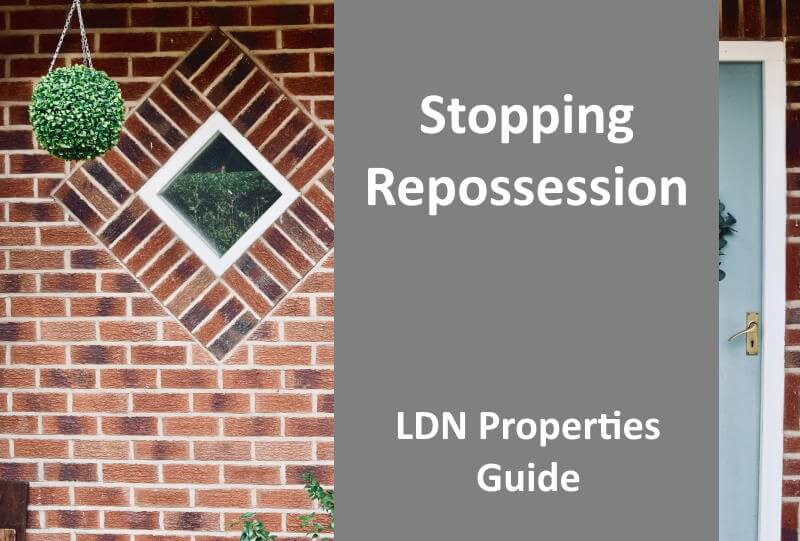
Repossession process
Without positive action on your part, the repossession process will consist of the following steps:
Contact From Your Lender – Your lender will contact you soon after a missed mortgage payment-typically after a two-week grace period, but this is not a legal requirement. In this conversation, you’ll discuss your plans for repayment, and the possibility of court action will be presented.
Pre-Action Protocol – Before a lender can lawfully pursue legal action, they must follow a set of procedures known as the pre-action protocol. These procedures ensure that a lender taking matters to court is purely a last resort and include presenting you with the following:
- The total outstanding on the mortgage
- The total amount of the missed payment(s)
- Details of any interest or additional charges that have been, or will be, added to the mortgage
- Information on the payments made towards your mortgage over the previous two years
Lenders are required to direct you to appropriate support services, including those in government and independent organisations. They should also consider your specific situation and the events that led to the overdue payment(s). Put simply, lenders must explore every opportunity for helping you regain financial stability before they can turn to the court. For more information on pre-action protocol for outstanding mortgage payments, you’ll find more information on Shelter Legal.
Court Action Begins – The lender will send a repossession claim form to the court in addition to any other documents relevant to their claim; you, as the defendant, will also receive a copy of these documents (sent to you by the court itself). Additionally, you’ll be given a Defence Form which lets you outline your circumstances, in detail, to the court prior to the hearing. Obviously, it’s vital that you fill this out with all the information relevant to your defence. Finally, you’ll be told the date, time and location of the case’s hearing.
At the Hearing – Here, you and your lender’s representative(s) will explain your respective cases to the judge, who will come to a decision on the fate of the property in question. Either the judge will dismiss the case-and your home won’t be repossessed-or they’ll grant a repossession order, meaning you’ll be evicted from your house at the lender’s discretion.
Eviction – If there is no possibility for you to feasibly keep up with the payments, and the judge grants the order, a date will be set for your eviction from the property. You must have left the premises by this date, although there may be opportunities to reclaim your possessions if left in the house after that date.
Create a Repayment Plan
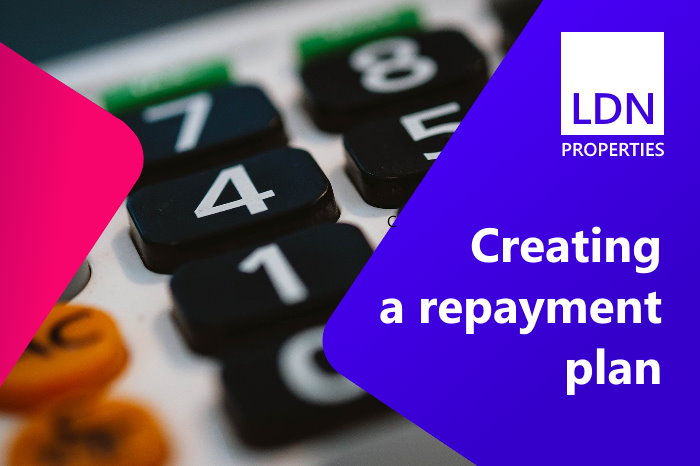
Creating a plan for settling your debt is not only useful, but also incredibly helpful in helping build your case in conversations with your lender. There are several parts to developing a repayment plan:
Gather Evidence – Compiling all of the evidence that proves your financial situation will inspire faith on the part of your lender, provide context to the rest of your repayment plan and help your case should proceedings be taken to court. This body of evidence can include bank statements, redundancy documents if you’ve lost your job, documents detailing benefits claims or anything else that helps illustrate your personal situation.
Budget – Reducing your outgoing costs will leave more funds to channel towards your outstanding mortgage payments. Take a look at your monthly outgoings – food, leisure, utilities and such – to see where you can cut costs. If it’s a shared house, a team effort will be crucial to keeping costs to a minimum; speak to your family about the importance of remaining frugal in this cash-strapped time. It might be necessary to make difficult sacrifices in order to save money, but when the alternative is repossession, there are few sacrifices too great.
Tracking your finances will be an important part of this process too: you’ll need to prove to your lender and possibly the judge that your expenses are markedly lower as a result of your budgeting efforts.
Increase Your Income – Increasing your earnings, in addition to helping pay off your arrears, can help prove to your lenders and the judge that your mortgage is a top priority. Taking a second job or working overtime at your existing job can be fantastic – and demonstrable – ways of boosting your income.
Seeking benefits (see "Universal Credit" further down this page) can be another method of increasing your income. There is, however, a waiting period associated with the benefits process, although lenders will likely be willing to wait if you explain this to them.
Draw Up a Repayment Offer – Regaining financial stability is one side of the coin, creating a plan to pay off your arrears alongside the regular mortgage payments is the other. You may choose to split the arrears up into bite-size chunks every month for the duration of your current mortgage plan; you might opt to pay them off in larger amounts; or you may even negotiate an extension of your mortgage term.

Steps for stopping repossession
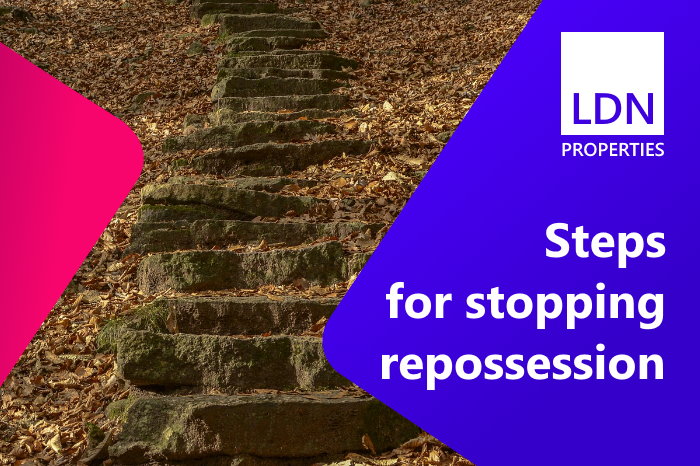
The options for homeowners in difficult financial situations are numerous. Before you give up hope and hand the keys over to your lender (never an advisable choice), ensure that you’ve adhered to the following advice.
Communicate With Your Lender
As soon as your financial situation makes paying your mortgage difficult, be proactive and discuss the situation with your lender. Banks and mortgage providers stand to benefit more from receiving regular mortgage payments than they do repossessing your house. If you reach out to them, and don’t wait for them to contact you, they’ll be more likely to regard you as a trustworthy and responsible borrower. This means that, in future discussions, they’ll be more lenient and likely to make concessions for you.
On top of this, you should also explain to your lender how you’re looking to rectify the situation. Perhaps you’ve started a new job and will settle the amount on payday; maybe you’re actively in the process of seeking financial support. Whatever your solution, if you’ve got a plan, most lenders will likely be happy to grant you time to carry it out.
Seek External Support
Contacting external support systems should be one of the first things you do after falling into arrears. Organisations like Citizens Advice, the National Debtline, Shelter or even the local council can help highlight the best way forward for your situation. Also consider hiring a solicitor; you may even be eligible for legal aid to help cover the associated costs.
Seek Out Support for Mortgage Interest (SMI)
While it won’t help cover the cost of the mortgage itself, Support for Mortgage Interest (SMI) can help you with the interest payments on a mortgage. Typically, only homeowners receiving a qualifying benefit will be eligible for this (find out if you’re eligible here), but it’s worth considering this scheme if you fall in that category.
SMI is paid as a loan, with interest, that you’ll repay when upon selling your home. Voluntary payments can also be made towards this loan if you’re in a financial position to make them. Unfortunately, regardless of your benefits situation, possessing more than £16,000 in savings or owning multiple residential properties makes you ineligible for the scheme.
Pay What You Can
Even if you’re unable to repay the outstanding sum in full, repaying what you’re able to afford will show your lenders (and the judge) that you’re taking steps to improve the situation. Plus, it proves that your mortgage troubles are a priority which will help build trust with your lender.
Seek Help From Friends and Family
If there are high levels of trust among you and your friends/family, and they’re in a financial position to offer it, consider seeking an interest-free loan or even a monetary gift from them. This advice won’t be applicable to many people—for a number of reasons—but never underestimate the support system provided by family and friends.
Mortgage Payment Protection Insurance (MPPI)
The phrase "payment protection insurance" may cause eyes to glaze over, but this isn’t that same thing is PPI; it could be a lifesaver for you in this current situation.
MPPI is an insurance scheme that promises to cover the cost of your mortgage should you lose your job or become too ill to work (or both, depending on the specific policy). If these are the reasons you’re facing repossession, check if you’ve applied for MPPI in the past. Claiming is often subject to a 30 to 180-day waiting period, although lenders may be willing to delay court action if you inform them of this waiting period.
Apply For Universal Credit
If you’re over 18 (16/17 in some situations), living with a low monthly income and possess less than £16,000 in savings, you may be able to claim for Universal Credit and receive help paying off your mortgage. You can start the process on the government’s website by providing them with your National Insurance number, financial information, housing information and details of any dependents (children, for example).
Within 10 working days of your online application being processed, you’ll be asked to attend a live interview with Jobcentre Plus to discuss your situation and the terms of receiving Universal Credit. Typically, you’ll have to fulfil a set of requirements, outlined in the interview, known as Claimant Commitments to receive the aid each month. These usually include applying for jobs, attending training courses and keeping the relevant authorities informed of changes to your circumstances.
After being approved for Universal Credit, it will usually take around 5 weeks to receive your first payment. For those in mortgage arrears, 5 weeks may be too long to wait. Thankfully, you can apply for an advance on your first payment which will have to be repaid over time.
Sell Your Home
While it’s far from ideal, in some circumstances, if, for example, your financial situation is unlikely to change and you have an alternative place to stay, it may be a good idea to look at selling your home. This way, assuming your house’s value covers the outstanding debt, you’ll possibly be able to stop repossession and sell the house on your own terms and almost certainly achieve a larger sum for it than if the lender was to sell it as a repossession.
If the lender repossesses your home, or you willingly pass the deeds over to them, the house will be sold as a repossession. That means that it’ll be sold often cheaply to move as fast as possible. In that circumstance, there’s potential for the house’s sale price to not cover the cost of your mortgage, meaning that you’ll both be without a home and still in debt. Additionally, you’ll still be required to pay mortgage, insurance and various other fees while the lender has your house on the market, including estate agent’s expenses; by selling the house yourself, before it’s repossessed, you avoid this.
Rather than putting your home on the open market, subjecting yourself to the numerous fees, wait times and untold stress that come along with that, our residential house buying service can buy your home quickly and without hassle. No matter if you are looking to sell your house fast in London or anywhere else throughout the UK, we are able to make you a committed cash offer for your home.
Rent Out Your Property
Renting out a room in your house (or your entire property, if you’ve got an alternative place to stay) can be an ideal way to increase your income and cover the cost of your mortgage arrears. Before you do so, it’s important to make sure that the additional income will be enough to meet the requirements of your mortgage repayment plan and that you are permitted to rent out a room.
Options for selling your home to stop repossession
You might decide that selling your house or flat is the best strategy to get quick access to cash and pay off the arrears with your mortgage lender and avoid repossession – which can damage your credit score and make it much harder to get a loan to buy a house in the future.
If that’s the case then you will need to sell in a relative hurry and there are two ways that you can typically achieve this: selling your home on the market, or to a specialist home buyer.
Selling your house on the market
If you sell through an estate agent, they will handle the work of putting together a listing for your property to advertise it and try finding potential buyers. They’ll also coordinate viewings, where people who are interested in your home will come to tour it so that they can see the exterior and interior in person.
Before settling on a particular estate agent you should shop around to compare their services and fees. When you sell your home through an estate agent, if they successfully find you a buyer then you will have to pay the estate agent a fee. This is typically charged as a percentage of the final sale price you are able to obtain. Some estate agents might be willing to negotiate to lower their fees, so it’s worth asking around about this option.
But be cautious with choosing an estate agent to handle your sale when you’re facing repossession of your property as you don’t know when you’ll find a buyer. Some properties sold through estate markets can sit unsold on the market for many weeks, months, on in certain scenarios more than a year. Because you’ll likely be facing time pressure from your lender to quickly sell, you should ask your estate agent for a closed contract of about four to six weeks for selling your home, rather than an open-ended agreement through which they have less incentive to work quickly to find you a buyer. Always remember that your top priority should be finding a buyer fast.
Selling your house to a specialist home buyer
The need to speedily locate a buyer for your house or flat when it’s at risk of repossession is one reason that many people in this situation turn to specialist home buyers.
This can be a great option because quick property buying companies specialise in making swift cash offers to buy homes of all types. For those people struggling with the potential for repossession this means they can not only get an accelerated sale without the risk of a house sale fall through, but they can also obtain a competitive price for their home to help their finances.
And the reputable fast home buyers never charge homeowners fees when selling their properties, which means that you’ll get to keep all of the profit from the sale for yourself (bear in mind you will need to pay for your legal fees). This contrasts to the fees that estate agents charge which will cut into whatever profit you’re able to make from a sale using that option.
The speed and lack of fees involved with selling are therefore two leading reasons why selling to a we buy any property company is often the preferred option for homeowners at risk of repossession who need a swift and zero-hassle way to sell their home.
What happens after repossession?
In the unfortunate event that all of your attempts to amicably resolve a threatened repossession with your lender fails and you lose ownership of your house or flat, you might be wondering about the implications for your ability to purchase a property in the future.
The good news is that it won’t be impossible for you to buy another home in the future, although your ability to obtain the necessary loan to help with the purchase might be complicated.
But if personal financial problems are the reason why you fell behind in mortgage payments, you need to make an honest assessment of whether you can afford to buy a new house or flat. Remember that in addition to the upfront cost of purchasing a home, there are additional one-time and also ongoing costs involved with owning a property. The true price of owning a home can be significantly more than the purchase price, and it’s vital that you budget properly. You don’t want to risk buying a property in the future only to fall behind once again on payments and again face potential repossession.
Is it possible to get a mortgage after repossession?
Yes, but there will be more complications because of the repossession. That’s because you will be seen as a risky investment by lending companies and many mortgage providers won’t make you any kind of offer, even one with a high interest rate and other strict terms.
But thankfully there are several specialist lenders who understand that negative situations can occur, including the repossession of a home. These companies should be able to help you with obtaining a mortgage that has reasonable interest rates that account for the problems from your past arrears without being so stringent that they risk creating the same issue once more with falling behind on making the legally required monthly repayments.
If you have had your home repossessed, don’t despair that you’ll never be able to buy a house or flat ever again. Instead, keep your expectations reasonable about what type of property you can afford and research and talk to some specialist lenders. They should be able to help guide you toward a loan that will help you buy a house for which you can afford to make the payments, helping you get a home without risking repossession happening again.
Why it’s important to act quickly to try resolving a repossession threat
It is generally considered advisable to contact your lending firm or a legal professional as quickly as possible once the threat of repossession has been made, because the faster that you act to try and resolve the situation the more likely you will able to keep your home.
As the housing and homelessness charity Shelter explains, there are several rights that homeowners have during the repossession process along with certain rules that mortgage lenders must follow. Knowing these rules upfront can significantly strengthen your ability to win a successful negotiation with your lender that can avoid the need for repossession.
Mortgage companies must talk with you about alternatives to starting the repossession process, including discussing the potential for a repayment plan or other relief.
If you feel that your mortgage lender is not following the rules with which they are required to comply, you could file a complaint with the Financial Ombudsman Service.
Important documents to complete for court hearings
Whether or not you have legal representation at this point, you should complete what is known as a personal defence N11M Form. This is a document through which you can detail your situation and financial difficulties, including the reason why you have fallen behind in your monthly mortgage payments. Be completely honest with this form because you will only cause more trouble for yourself in the long run if you omit or lie about any information.
The UK government’s website provides a template for the form that you can print out and complete and then return to the court. You have two full weeks to fully complete the form and send it back to the court, or if the lending company has made their repossession claim against you online you can submit the form online. Whichever method you use, be sure to retain copies of all the documents that you have about the process in case you need them going forward.
Another important document that you may fill out is what’s known as an N244 Form. This is a form on which you’ll detail your situation and ask the county court overseeing your case to either block or at the very least delay any eviction or repossession of your house or flat. Again, be completely upfront on the form and don’t deliberately or accidentally hold back any information.
Judges aren’t looking for reasons to allow repossession of your home – indeed many are looking to the forms and the facts of the cases before them to try finding ways that they can keep homeowners in their properties. You will be viewed more favourably by a judge if you can prove that you have stayed in regular contact with your lender; that you have acted in a way that shows your genuine attempt to resolve the situation; that you have been responsive to any calls and letters and other messages you have received about the potential repossession; and that you have explored all possible options with your lender about addressing the missing payments.
Potential outcomes from repossession legal proceedings
Even after legal proceedings have started, some mortgage companies might contact you outside of the court to discuss a possible agreement for how to resolve the situation. Do not panic and sign anything quickly. Instead, find a legal professional to review the text of whatever proposal your lender might offer so that they can review the merits of it.
One step you can and should take is to try paying your mortgage lender however much money you can toward your arrears, no matter how small that amount might be. This will be seen by both the lender and, more importantly, the judge overseeing your case that you are making an earnest effort to get back on track and that you intend to eventually pay the full amount.
Ask your lending company about whether they offer any funding assistance in cases where repossession proceedings have started. They might be able to give you an extended amount of time to sell your home or lower your monthly payments until a solution can be reached.
In those instances where a repossession case proceeds all the way through to the judge making a final order, there are several possible outcomes that can happen.
One result might be that the judge adjourns the case if they do not believe they have sufficient facts to make a ruling one way or the other. This would effectively put the repossession on hold.
Another way that your case might conclude is that the judge issues a suspended possession order. This will give you the permission to remain living in your house or flat on the condition that you have a workable strategy for repaying your arrears – even if that means ultimately selling your home, whether on the property market or to a fast home buyer. Adjournment can also happen in this situation, putting the repossession on hold whilst you repay the funds.
Or the judge might issue what’s known as a time order, which directs your mortgage lender to revise your financial obligations. This can happen in several ways, including amending how much you have to pay in monthly instalments, extending the length of the mortgage, lowering the amount that you owe to the lender, or other changes.
Your legal advisor or professional will be closely tracking to see whether your lending company is adhering to the various regulations that aim to protect homeowners during repossession proceedings, because if they violate any of the rules then their case might be thrown out. This would have the effect of ending the proceedings and letting you stay in the home.
Sadly, some cases do result in what’s called a possession order, which happens when the judge sides with the mortgage lender and backs their repossession authority. Typically, homeowners have 28 days to pack up and leave their properties before the lender takes them over, but you could ask the judge to potentially extend the deadline if necessary.
Questions you may have regarding repossession
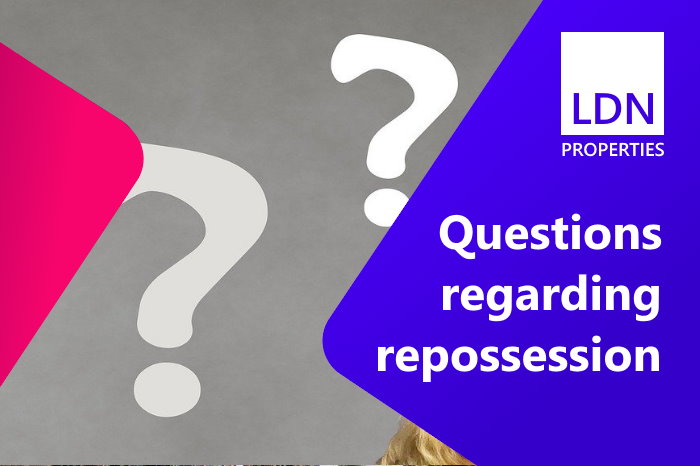
✅ Should I ever choose voluntary repossession?
In almost any conceivable circumstance, the answer to that question is no. Leaving your property in the hands of your lender to be sold will often result in a lower ultimate sale price, which may not even cover your outstanding debt. Additionally, while your repossessed property is on the market, you’ll still be liable for mortgage payments, home insurance and any other fees you’re currently paying.
In almost all circumstances, it’s better to sell your house on your own terms than leave it in the hands of your lender. LDN Properties’ residential property buying service can provide fast and fair house sales without any fees.
✅ What happens to my debt if repossession occurs?
If the lender repossesses your property, it will be placed on the open market and sold for the highest possible price (which is still likely lower than market value). The funds from the sale will be put towards paying off the mortgage, any interest and all arrears; legal fees; repair and maintenance fees; and the cost associated with selling the house. After all debts-including the ones secured to your home-are paid off, any remaining funds will be paid to you.
If there are debts remaining, you will still owe the outstanding amount to your lenders unless they decide to write the debt off.
✅ How long does repossession take?
The process from missing a mortgage payment to losing your house is a long one; even if a repossession order is given by the judge, it can be anywhere from 28 to 56 days before it comes into effect. All told, the entire process can take anywhere from 6 to 12 months. This depends entirely on multiple factors including your situation, how cooperative you are with the lender and what sort of efforts you make towards remedying the situation.
✅ What are the types of repossession?
Outright Possession Order – This gives the lender, after a period decided by the court, complete legal write to own and sell your home.
Suspended Possession Order – This means that your continued ownership of the home is dependent on regular payments towards your mortgage. Without payments, you will be evicted.
Money Order – With this order, you remain in your home and the lender cannot evict you; however, if you fail to keep up with payments, possessions can be removed from your home and sold. On top of this, money can be taken from your wages to cover the payments.
Time Order – This sees the judge adjusting your mortgage in terms of the regularity of payment and the interest rate. If you fail to keep up with payments, even with the adjusted time scale, you can be evicted.
✅ Is the Judge's Decision Final?
Not necessarily. If you feel like mistakes were made or your case was improperly presented during the initial court hearing, you can request to appeal the judge’s decision. The appeals process is normally started by consulting with either the original judge or, in some cases, a more senior judge. At the appeals hearing, a judge will either maintain the original decision, come to a new decision or call for a new hearing entirely.
If you aren’t earning low wages or receiving benefits, you may also stand to pay additional fees for the appeals process.
Looking for legal advice before repossession
If you’re facing the risk of repossession of your house or flat, you should urgently seek out legal advice because there can be a lot of complicated paperwork and steps involved – and a solicitor or other legal professional can not only handle this on your behalf, but also work to defend you and potentially find a way to help you prevent repossession entirely.
Although the company that gave you the mortgage for your property does have the legal authority to pursue repossession in certain circumstances where you’ve failed to keep up with your monthly mortgage repayments, they are not allowed to pressurise you into giving up your home by sending you threatening letters or making similar threats with phone calls.
It’s important that you take a deep breath and do not panic during this high-stress period. Understand that you have significant rights and your mortgage company cannot quickly force you out of your house and take away your ownership of it. Repossession can be a daunting experience but there can often be some relatively simple answers that can resolve the situation. Having adequate legal advice can make all the difference with trying to find such answers.
Unfortunately, many homeowners are not fully aware of all of their legal rights during repossession. It can be very easy for a homeowner to see a threatening letter from a lending firm and feel like there’s nothing you can do about it. But that’s not the case and you often have options.
However, you will likely need some advice or legal support from a professional who can help you navigate the complexities involved with the threat of repossession of your house or flat.
Paying for legal advice about repossessions
For those homeowners that can afford to pay for a legal advisor during this stressful time, the first step you should do is research online to find professionals with expertise in handling repossession threats and attempts, because they will know how to help you with your case.
You should spend some time to carefully review the law firms that you discover, because some will have better ratings than others. Be sure to compare and contrast the various legal professionals to determine which ones appear to have the best reputation.
And don’t be afraid to shop around to see whether you might be able to save money by using one solicitor’s office compared to another. Your goal is to find the best legal representation possible to help you with trying to deal with your repossession, but it’s certainly possible to find legal advice that offers a perfect balance between affordability and great reputation.
Other repossession resources
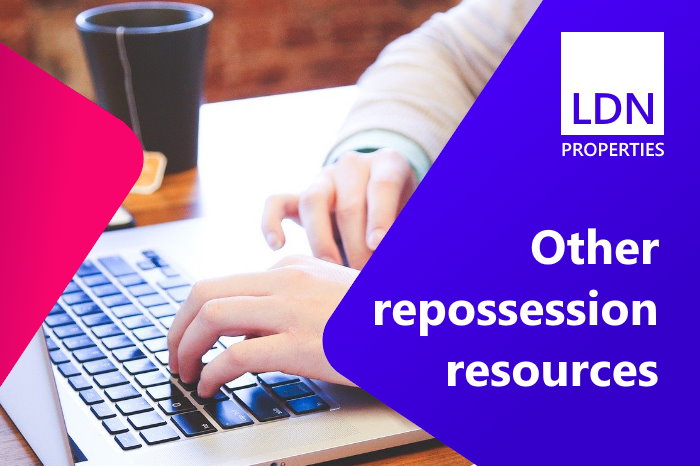
Or perhaps you are struggling with limited finances due to various circumstances including job losses or other problems, and if that’s the case you might not have the available funds to pay for a potentially expensive legal advisor to help with your repossession. But don’t despair because there are a host of free services that can also offer you advice.
Several non-profit entities and charities in the UK work to provide homeowners with free unbiased advice on repossessions, and many can be reached every day of the week. Calling these services can be a great first place to start on your path to finding legal advice.
Here’s a list of some organisations that offer free advice to homeowners facing repossession:
Business Debtline (a charity offering free and independent debt advice)
Telephone number: 0800 197 6026
Opening hours: Monday to Friday 9am to 5.30pm
Citizens Advice (a network of charities offering a wide range of advice)
Telephone number: 0800 144 8848
Opening hours: Monday to Friday 9am to 5pm
Debt Advice Foundation (a specialist debt charity offering free advice)
Telephone number: 0800 043 40 50
Opening hours: Monday to Friday 8am to 6pm
The Money Charity (a charity that offers advice on managing your money)
Telephone number: 0207 062 8933
National Debtline (a charity providing free debt advice to people across the UK)
Telephone number: 0808 808 4000
Opening hours: Monday to Friday 9am to 8pm, Saturday 9.30am to 1pm
Shelter (a housing and homelessness charity)
Telephone number: 0808 800 4444 or 0808 1644 660
Opening hours: Monday to Friday 8am to 8pm, Saturday to Sunday 9am to 5pm
You could also contact the Financial Ombudsman Service, which was created by Parliament in 2001 with the goal of resolving complaints between financial businesses and their customers. Their website states that it aims to resolve complaints between both sides impartially "based on what we think is fair and reasonable in all circumstances of the case."
This includes mortgage companies and the homeowners who have taken loans from them, particularly when there is the threat of repossession.
If you complain to the Financial Ombudsman Service about how your mortgage company is handling a repossession, they will review all of the facts about your individual case and eventually issue a decision that they’ll send in writing to everyone involved.
When a homeowner accepts the ombudsman’s findings, that decision is considered to be legally binding on the mortgage company and must be followed by them. That means if the ombudsman rules that the lender has acted unfairly in how they’re handling the repossession process, it would be binding on the financial lender.
However, homeowners do not have to go along with the final ruling the ombudsman issues and can walk away from the independent review process at any stage. After that happens, homeowners can proceed to court. If that happens then a court will review whatever work the ombudsman has done on the case, because this will help to inform the legal proceedings about the potential house repossession.
For any additional queries regarding mortgage arrears, stopping repossession and the ways we can help, please contact our expert team at LDN Properties. We’d be happy to discuss your situation.
See what we can offer?
Let us show you what we can pay for your house
We’re rated as Excellent
Reviews.co.uk provide independent reviews from other people just like you!
"Successfully sold two properties direct to LDN Properties in the last two years. Genuine and trustworthy people and the dealings were straightforward." – Thomas from London
Cash offer for your house

LDN Properties Limited, Linen Hall, 162 Regent St. London W1B 5TD
Company No. 04636129. ICO No. Z7733416. Ombudsman No. D12463.
Copyright 2003 to 2026